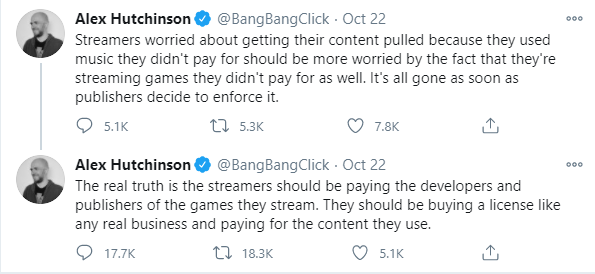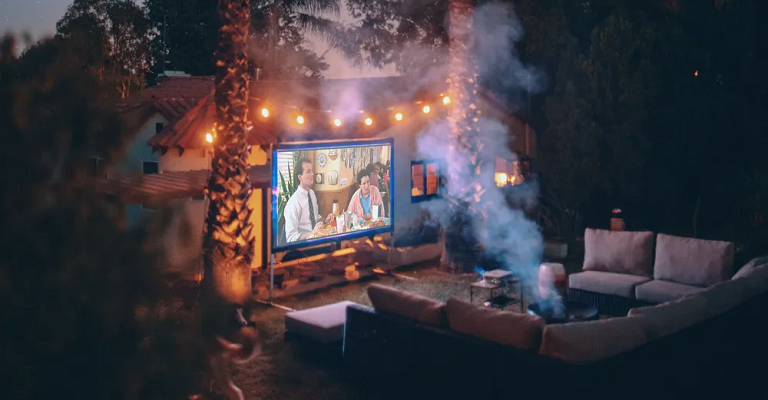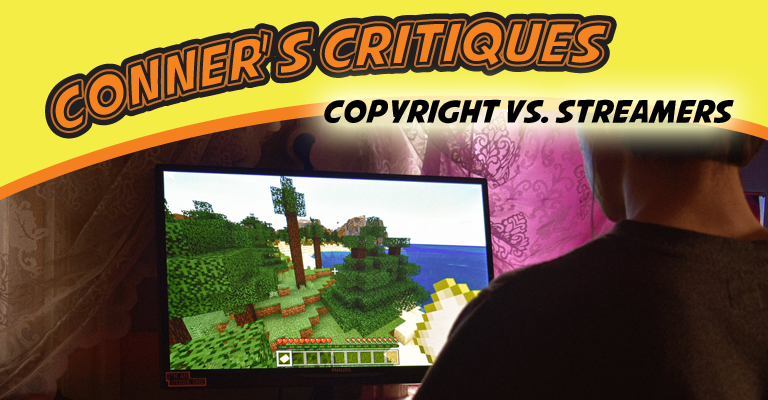In the past, we’ve tackled the argument of licenses in the gaming world, and the company’s arguments about how game companies want to be able to argue back and forth on what rights purchasers have with regards to their video games. You can see our vicious breakdown Here!
But Alex Hutchinson recently attacked a whole group of people on the Internet, side mouth calling them freeloaders. Saying that streamers should have to purchase a license to be able to stream games, and game publishers are in their rights to DCMA strike and should be the next thing to hit the internet.

So what is he talking about?
Public Performance License
Not a lot of people know this, but when you purchase a video game or a movie, you are purchasing a very specific license, (notwithstanding our discussions in the prior provided link about their attempts to fluctuate what license you are actually receiving). That license is specifically only for personal use.
That personal use includes your family, a couple of friends maybe, but not for public consumption. Fun fact, when you go to a church event and they play a movie to the whole congregation, that is a violation of the Federal Copyright Law, and therefore a criminal action covering penalties.

If you want to show movies at public events, like Drive-Ins, Movie Theaters, or Streaming, you have to personally own the content, or have a license to the content. For instance Twitch this year started allowing affiliates stream live views of certain shows in their catalog because they had the right to allow Public Performance with the copyright holder.
But does this apply to video games? Technically, but here is where things get a little dicey.
What Is Fair Use?
Fair Use is a general exception to copyright law and allows specific protections for the purpose of free speech.
One such exception applies to the “nonprofit-educational” for teaching environments, allowing teachers to show a class a movie, a small group, even without a Public Performance License, as long as it is a small crowd and the purpose of it is specifically for the purposes for education. Entertainment would not apply there. This doesn’t work for streamers clearly.
Another exception applies to the “factual basis” rule, which gives specific allowances for use of content if the content is specifically based solely on factual events, and not on a creatively fictional basis. Unfortunately for streamers, barely any video games would fall under this category.
Another exception applies to Parody. Streamers like Lets Game It Out and Call Me Kevin might do enough comedy, and mockery in their videos to qualify under this tab, but most other creators would not fall under this umbrella.
The other exceptions to the rules would be potential market value, the substantiality of the use of the copyrighted work, and did the use of the product in the unlicensed action “transform” the copyrighted material. That’s the meat of the argument, and we are going to dive into that.
Transformative Content
With regards to “Transformation,” the courts consider the new product in relation to the original purpose of the content. Making sure that the new content does not have the same intent and value as the original content. That’s where there might be a hang-up. When dealing with a movie, a reaction video or review video, the courts have found those new content to fit Fair Use under the basis that as long as they show a limited amount and their review is enough content to change the content, even though they are in the same format because it’s different content.
With regard to video games, it’s the same content on the same path. I can see some on the rails games being a real issue for streamers, because no content is changing, and it’s playing at the same time as the content attempting to change the material. However, some open-world games, with multiple options feel like anything the creators do with it would be transformative because the creators didn’t design the specific path the streamer took.
It almost feels like a person creating a sport, and then trying to prevent someone from filming themselves playing it.

However, I would say that the streamer engaging, reacting to his playing it is very important for the concept of Fair Use, again if a player is just streaming the exact story mode of a game from start to finish, nothing else, no review, no transformation, I could definitely see how that would be a violation of copyright law.
Final Thoughts
There is definitely a benefit to having your games streamed online by content creators. It’s like an additional wing of advertisement. Publishers know this, it’s why they give creators codes for them to stream and review their content. People see the games, people then go and buy the games. Not all creators, especially the smaller ones, are able to have that relationship though. The game publishers still benefit from it. Think about the trends toward Fortnite, Fall Guys, and Among Us.
The main reason that Fortnite beat PubG and others in the industry had to do partly with how the streaming community took the platform and ran with it. If they had shut down that source of advertising, they may not be as successful as they are right now.
It would be a death knell for a company in this day and age to specifically try to silence streamers playing their game. The consumers of games would turn against them and it would not go well. Look at how the world viewed Nintendo’s view toward streaming their games. They copyright striked a bunch of their games on Youtube, only allowing people to post gameplay videos, no matter the transformative nature, unless they were in their creator program, and gave a share of their profits to Nintendo.
After many giants in the streaming world made it clear they wouldn’t come near the games, Nintendo changed its’ policy on its head and shut it down.
No court case has heard on the basis of video game streaming. Many courts have heard in regards to video content and found in favor of Fair Use, but it’s uncharted territory. Look, it’s hard to say what the courts will do in the future, especially with how they are currently packed, and the conservative swing of the judiciary branch, but if the rules that have been upheld in the past are applied, then the works of streamers with their videos would be considered protected, and as such Alex Hutchinson can go pound sand.


Facebook Comments